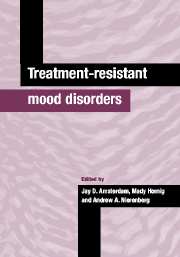Crossref Citations
This Book has been
cited by the following publications. This list is generated based on data provided by Crossref.
2003.
Cognitive Therapy for Chronic and Persistent Depression.
p.
397.
Moras, Karla
2006.
The Value of Neuroscience Strategies to Accelerate Progress in Psychological Treatment Research.
The Canadian Journal of Psychiatry,
Vol. 51,
Issue. 13,
p.
810.
Kemp, Andrew H.
Gordon, Evian
Rush, A. John
and
Williams, Leanne M.
2008.
Improving the Prediction of Treatment Response in Depression: Integration of Clinical, Cognitive, Psychophysiological, Neuroimaging, and Genetic Measures.
CNS Spectrums,
Vol. 13,
Issue. 12,
p.
1066.
Straasø, Birgit
Lauritzen, Lise
Lunde, Marianne
Vinberg, Maj
Lindberg, Lone
Larsen, Erik Roj
Dissing, Steen
and
Bech, Per
2014.
Dose-remission of pulsating electromagnetic fields as augmentation in therapy-resistant depression: a randomized, double-blind controlled study.
Acta Neuropsychiatrica,
Vol. 26,
Issue. 5,
p.
272.
Alfonso Ontiveros, Jose
2019.
Antidepressants - Preclinical, Clinical and Translational Aspects.
Brenner, Philip
Brandt, Lena
Li, Gang
DiBernardo, Allitia
Bodén, Robert
and
Reutfors, Johan
2020.
Substance use disorders and risk for treatment resistant depression: a population‐based, nested case‐control study.
Addiction,
Vol. 115,
Issue. 4,
p.
768.
Yunilayne, O. A.
Starostina, E. G.
and
Oleichik, I. V.
2023.
Hypothalamo-Pituitary-Adrenal Axis in Depressive Disorders and Treatment Resistance.
Psikhiatriya,
Vol. 21,
Issue. 1,
p.
73.





